In the wake of the killing of George Floyd in Minneapolis in the summer of 2020 and the protests that followed, economists, as others, have scrutinized their own biases and racism within the profession itself. The economics profession has long been criticized for often ignoring the structural basis of racism or, in general, any form of identity-based discrimination. Is there something about the way economics is taught that makes it difficult for economists to identify and address structural racism? A survey of around 500 economists that we ran earlier this year would suggest so.[1]
In this post, we unpack what survey data says about different types of economists’ capacity to teach about structural inequalities, and relate the results to how various theoretical traditions in economics approach inequalities related to group identities. Based on this analysis, we argue that long term and structural change in the economics field is necessary in order to make it more cognizant of how racism and colonial legacies impact on economic processes - and that such change must include a reform of how we currently teach economics.
Mainstream Economists Are the Least Likely to Teach About Racial Inequalities and Colonialism: Why?
One of the questions in the survey asked the respondents whether they teach courses that allow for an understanding of racialized inequalities and/or the role of European colonialism in shaping economic outcomes. The answers indicate that economists have a lot of work to do on this front.
While only about half of the respondents answered yes ─ the results differ markedly depending on the type of department the respondent is based in. As Figure 1 demonstrates, only 38 percent of respondents in mainstream economics departments claim to teach courses that allow for an understanding of racialized inequalities and/or the role of European colonialism in shaping economic outcomes. Meanwhile, 87 percent of economists in pluralist / heterodox departments, and 84 percent of economists in other departments answered the same (“other” includes development studies, political economy, politics, and interdisciplinary departments). Among all the disciplines, economists in mainstream departments are the least likely to teach courses which allow for such an understanding.
Figure 1: Percentage of economists who teach about racialized inequalities or the role of European colonialism in their courses (by department)
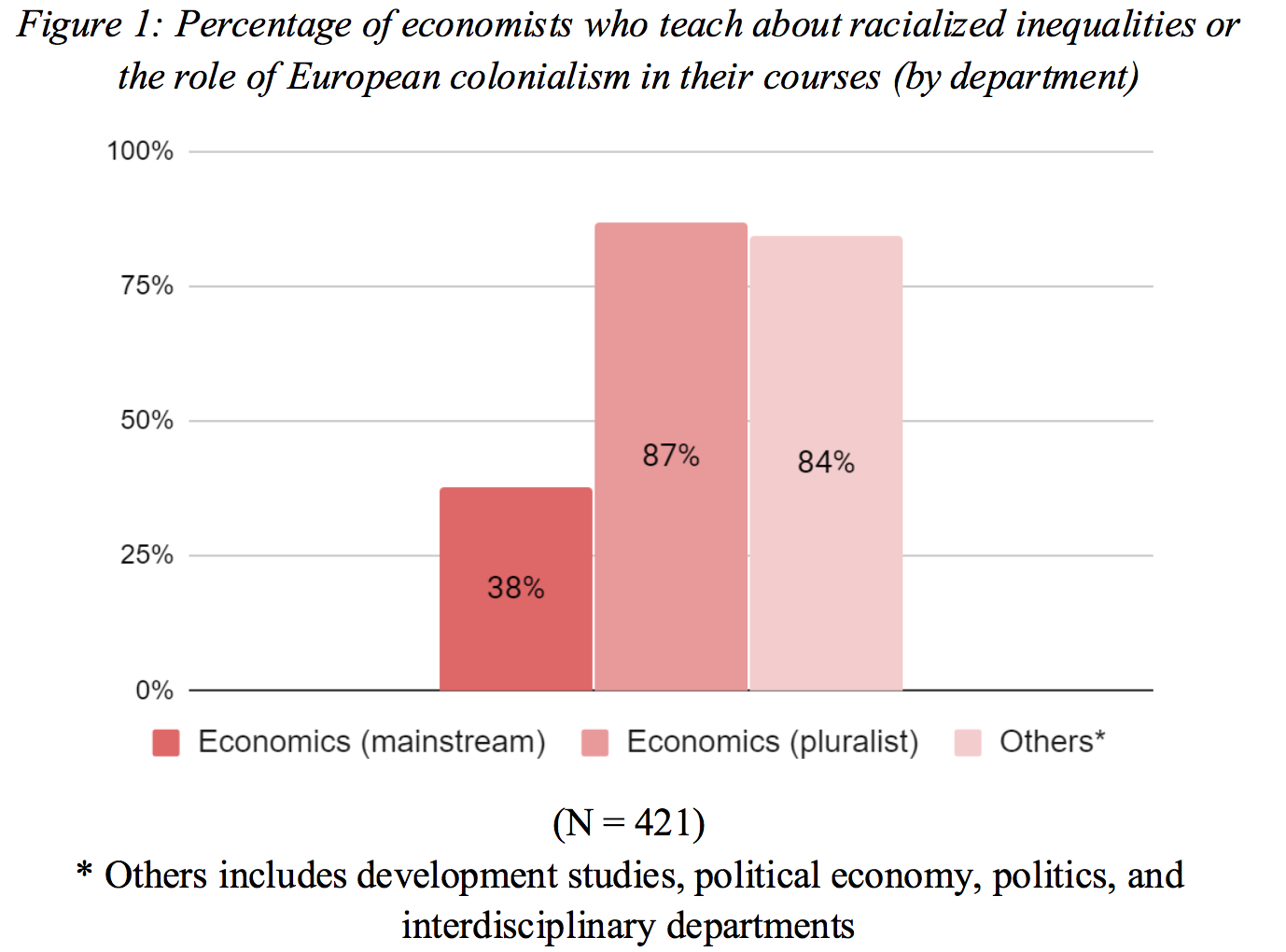
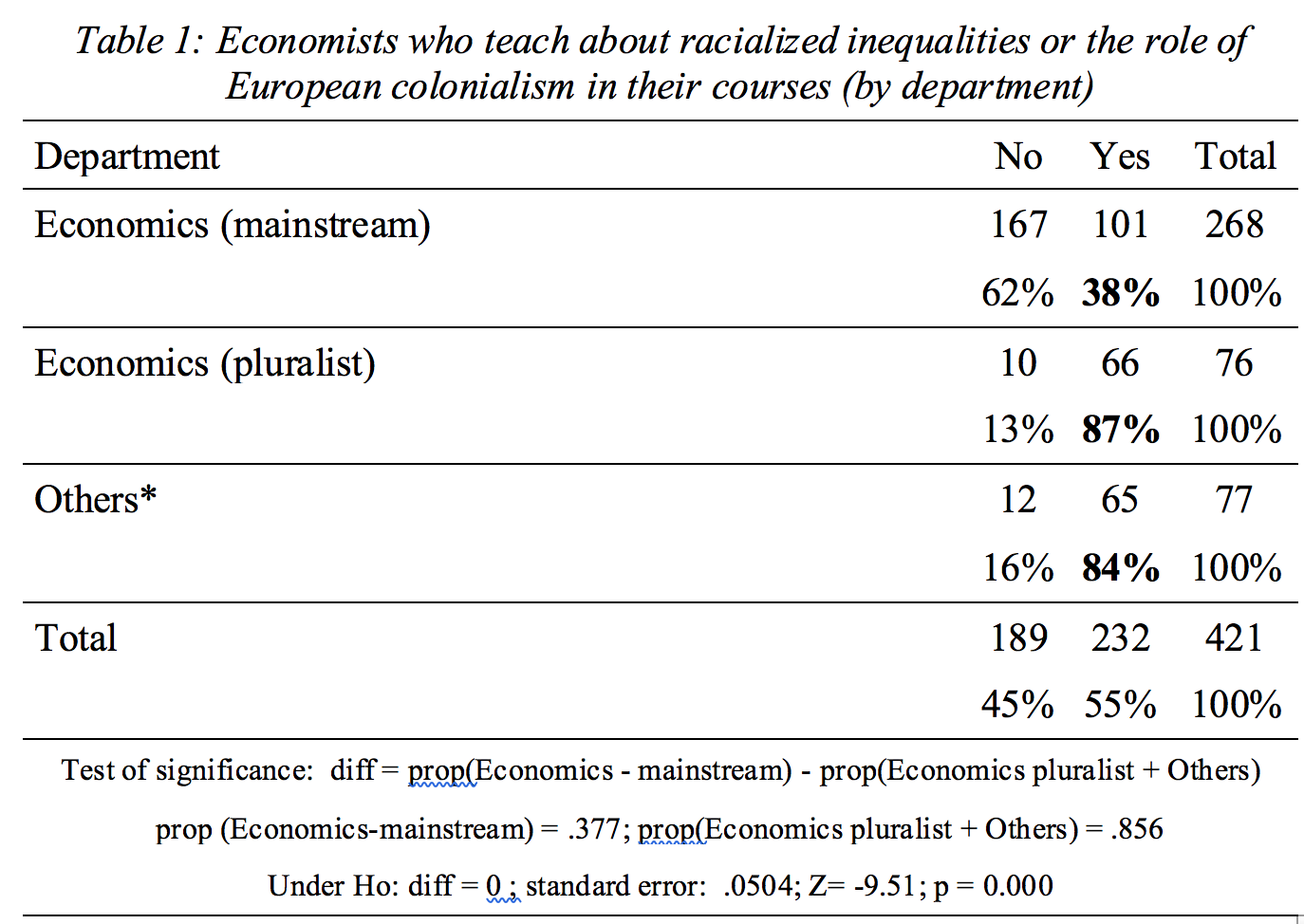
Why is it that more than 60 percent of mainstream respondents do not teach courses that allow for any understanding of racialized inequalities or the role of European colonialism in shaping economic outcomes? To understand this, it is instructive to unpack the nature of the field itself. Indeed, there have long been important critiques of economics from a race perspective. For example, Tilley and Shilliam (2017) demonstrate how the individualizing paradigm that homo economicus hides the interconnectedness of race and class by reducing racism to individual actions and racialized injustices and inequalities to the personal insufficiencies of the non-White.
With methodological individualism as the basis of neoclassical theory, discrimination, even when recognized within this theory, is often ascribed to individual behaviour. The result is an active occlusion of the role of discriminatory institutions and other political and social structures that create or perpetuate such identity-based discrimination. As a result, discrimination is often reduced to an issue of “taste and preferences” (e.g. Becker, 1957). As Albeda and Drago (1997), put it “Discrimination then is like tofu in that it is something you are willing to pay for—if you have the ‘taste’.”
When mainstream economics does move away from taste-based reasoning, it ends up attributing discrimination to its next, more “rational”, kin - statistical discrimination. Following statistical discrimination, there is in fact some real basis for such discrimination. For example, if on average certain identities are less likely to receive good quality education (which is likely to affect productivity), then, in absence of complete information about every individual, there is a rational basis for, say, an employer, to discriminate against an individual belonging to a specific identity based on this average statistical difference in their education (see Arrow, 1998 for a review). In some other instances, culturally and socially dictated irrational behavioral practices among certain identities are often argued to be the cause of worse outcomes for those identity-groups (e.g. Thomas Sowell arguing that Black Americans are poor because of their culture; see Sharpe, 2008 for critiques of this view).
But the discipline falls markedly short of recognizing the structural, historical factors that are central for producing and perpetuating inequality across groups, both in terms of opportunities and outcomes. With such an understanding, policy proposals are often limited to designing better mechanisms to ensure completeness of information or “nudging” disadvantaged identities to opt for more rational behavior, or, in more centrist circles, advocating for better opportunities (such as schooling) for these socially disadvantaged identities.
These understandings, however, have not gone uncontested. For example, stratification economics views inter-group inequality as a result of long-term effects of dispossession of property brought about by historical factors (see Darity, 2005; Darity et al. 2015). Work on labor market segmentation argues that labor market inequalities are a result of a historical political-economic process that divides labor into segments based on differential characteristics and behavior. Such segmentation is seen as functional to the process of capitalist accumulation by playing a role in weakening the possibility of an across-identities political front, in dampening aspirations for certain identities, and in diluting the pressure on other social institutions that facilitate a reproduction of the class structure (see Reich et al, 1973). Notably, these alternate strands foreground the historical, political, and social factors that are responsible for inter-group inequality - an aspect almost absent from mainstream economic theory. While some mainstream literature has made attempts to engage with these theories, it still remains well outside the dominant discourse.
Radical political economy analysis goes a step further, to also explore why structural inequalities between groups continue to exist, and how these structural factors shape the nature of its persistence. Consider, for example, Walter Rodney on the role of colonialism, imperialism, and class interests in perpetuation of such segmentations and disparity, Cedric Robison for the evolution of capitalism as a racialized system, Antonio Gramsci on the role of cultural and political hegemony for a perpetuation of these inequalities, Silvia Fedricci on understanding capitalist development from a feminist lens, and JK Gibson-Graham on how social identities and the economic structure overdetermine each other to produce the broader structure. These radical traditions and their insights have been systematically excluded from the mainstream economics discourse to the extent that they are not engaged with and / or taught in mainstream departments. Such exclusion cannot simply be attributed to ignorance of the mainstream; instead it has political underpinnings wherein any intellectual contribution that actively questions the dominant political structure is actively suppressed.
Economics has not always been so narrow and so heavily dominated by neoclassical economics. There was a formalization of the profession that started in the 1950s, which led to a gradual exclusion of political economy and heterodox economics from many economics departments. This led to an increase in abstraction from historical and political economy analysis, largely moving towards a more apolitical and ahistorical science (Kayatekin 2009). Economists who study political economy (in the classical sense) and heterodox economics are now often to be found outside of economics departments, or in the few remaining radical (or heterodox) economics departments. This has clearly also made it more difficult for scholars in mainstream economics departments to deal with historical and structural inequalities.
The economics discipline’s lack of capacity to see and address structural inequalities may be a part of the reason why it has struggled with misogyny, racism, and a lack of diversity. After all, a discipline centered on methodological individualism and marginal productivity sends a (perhaps unintentional) message to students that “you get what you deserve”. As John Harvey provocatively put it in Forbes last year, “For whom is ‘you get what you deserve’ likely to strike a chord? Women? People of colour? White males?”
The fact that many economists have responded to police brutality in the US by calling for more randomized control trials (RCTs) to test various behavioral and other narrow interventions is a manifestation of this kind of individualized way of thinking about structural problems (Dr. Doleac’s new blog is an example of this; for critiques see Ruccio, 2019; Kvangraven, 2020; Kabeer, 2020). Economists’ surprise that body cams don’t reduce police brutality is another example. Recently, two heterodox economists summarized the problems of attempting to address structural racism with micro-oriented and behavioral interventions (Wilson and Buchholz, 2020).
Against this backdrop, it is perhaps not surprising that mainstream economists are the least likely to teach about racism or impacts of colonialism in a structural manner. It does not make us optimistic about the future of the discipline to see that the most junior economists are also those that are the less likely to teach courses that allow for an understanding of structural racialized inequalities and/or the role of colonialism in shaping economic outcomes (see Figure 2).
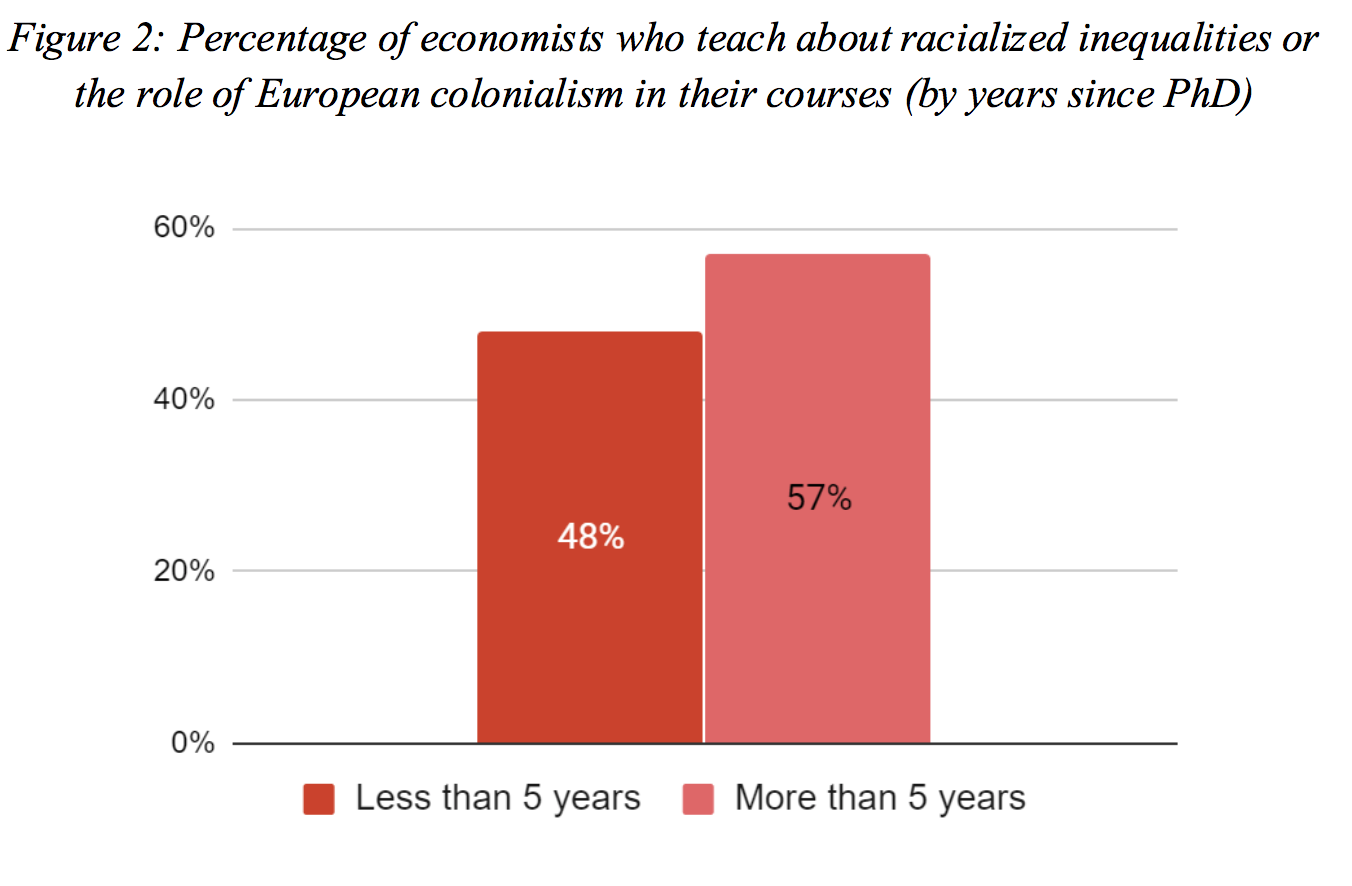
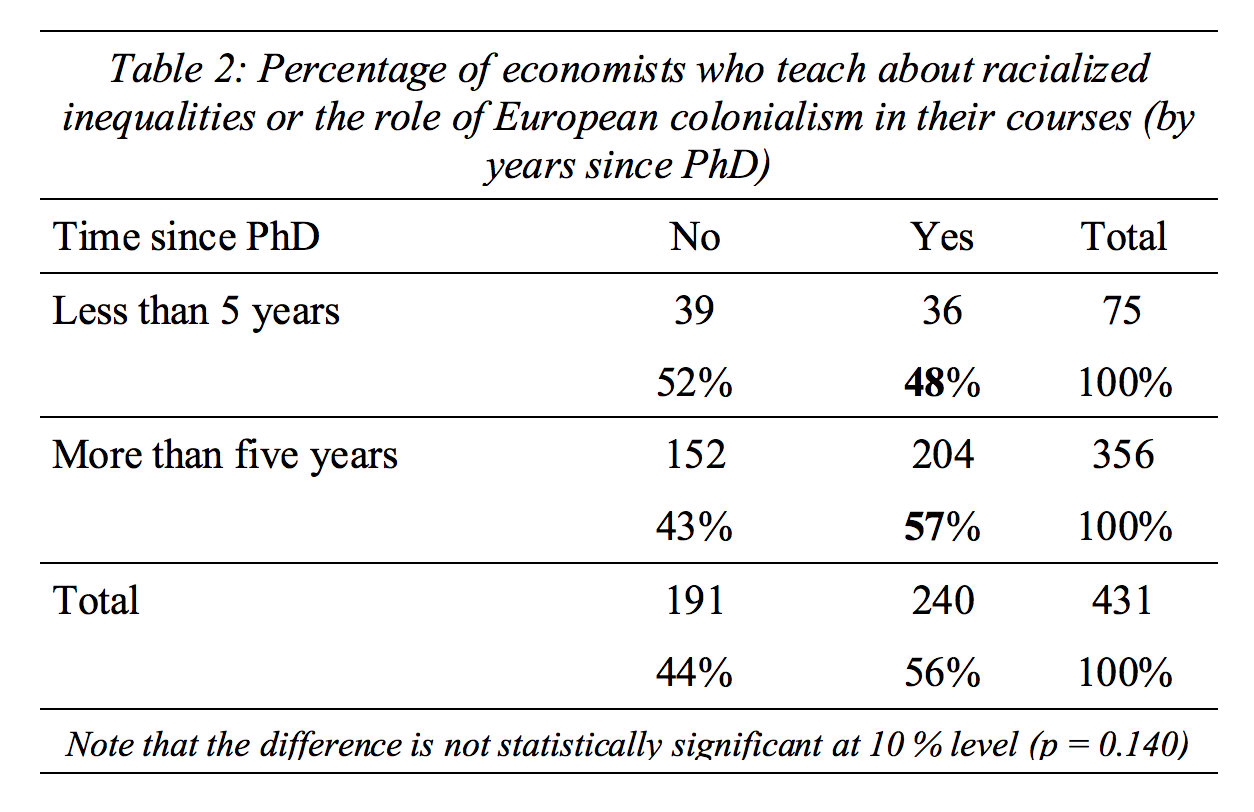
Identity and Positionality Matters for Teaching Economics
Teaching about racism and colonialism cannot be simply reduced to an issue of mainstream economics vs. other forms of economics. For example, our survey demonstrates that 86 percent of economists based in the Global South teach about racialized inequalities or the role of European colonialism, versus only 54 percent of those in the Global North (see Figure 3). Furthermore, among the survey respondents that answered that they have felt excluded based on their race, ethnicity, nationality or religion, 69 percent answered that they did teach about those issues, whereas only 49 percent of those that said they had not felt excluded based on their race, ethnicity, nationality or religion responded the same. Further, 65 percent of women said they teach these issues, versus 54 percent of men.
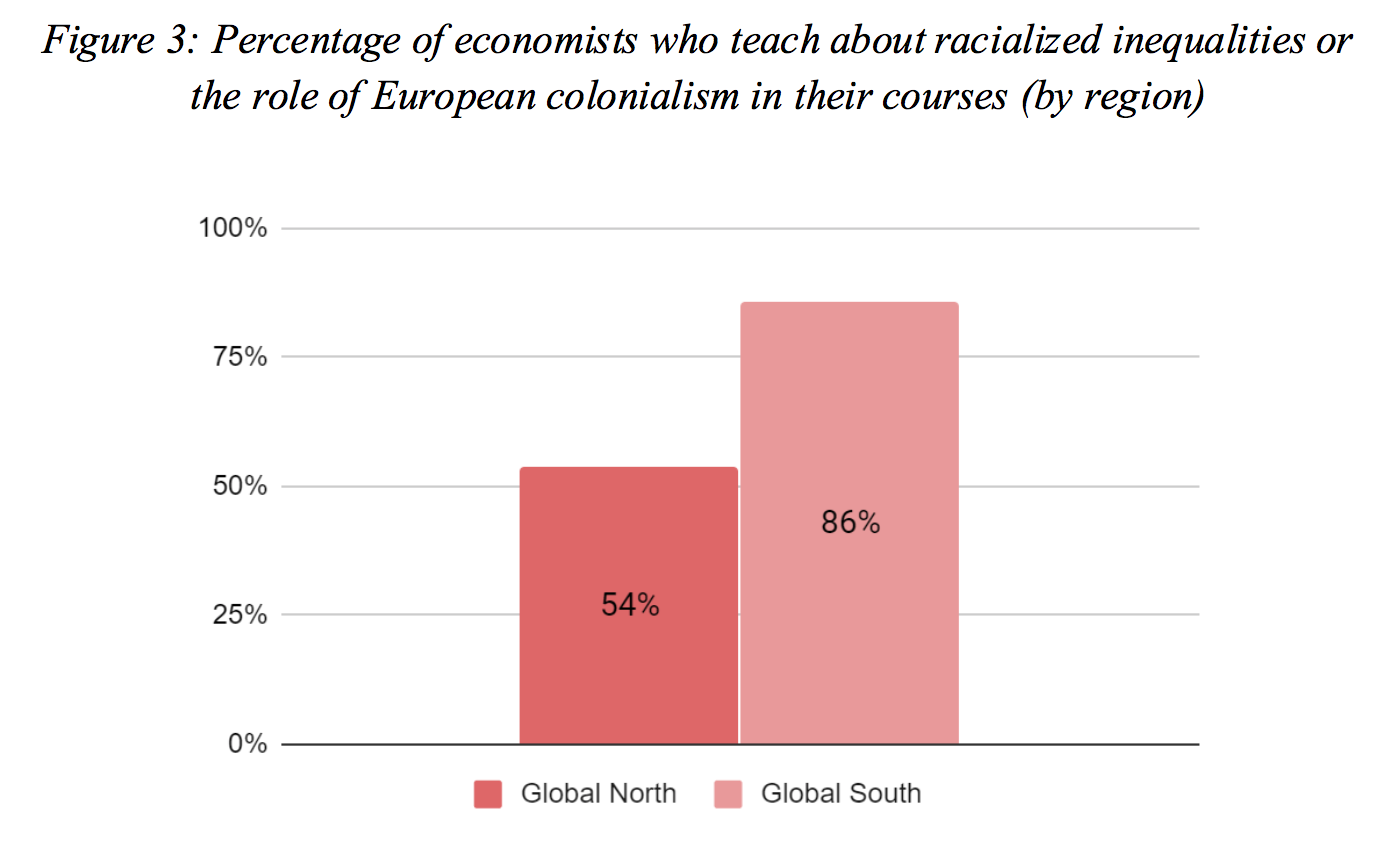
Given that scholars that have experienced discrimination are more likely to recognize it as a structural problem,[2] in addition to the issues identified in the previous section, it also becomes a problem that economics is very white and male, and that not much progress has been made on improving the situation. For this reason, improving diversity in the economics field can also, to a certain extent, improve the field’s ability to address structural inequalities. In order to achieve this it is then important to also address the fact that economics is particularly hierarchical and exclusive, and that the top of the hierarchy is centralized in just a handful of universities in the Global North.
To strengthen our survey findings and examine how the likelihood of an economist to teach about racialized inequalities or the role of European colonialism in their courses varies with different individual-level characteristics, we estimated a dichotomous variable using a logit model with maximum likelihood estimation (see Table 3). Here, the dependent variable takes the value 1 if respondents (economists) teach about racialized inequalities or the role of European colonialism in their courses and 0 if they do not. This is regressed on the individual-level characteristics identified earlier and our findings resonate with those outlined in the descriptive statistics earlier. The results are reported as an odds ratio.[3]
We find that even after controlling for other characteristics, on an average, economists teaching in heterodox / pluralist departments as well as in other interdisciplinary, development, political economy, or political science departments are much more likely than economists in mainstream departments to teach about racialized inequalities or the role of European colonialism (and the results are significant). Further, in terms of social identity, on average, those based in Global South, women, and those who have experienced exclusion based on their race, nationality, ethnicity, or religion, are significantly more likely to teach these aspects in their courses relative to those based in the Global North, men, and those who have not experienced such exclusion, respectively. Our regression results also support, after controlling for other factors, that those that finished their PhD more than 5 years ago are more likely to teach these aspects than those with less than 5 years since their PhD; thereby, the possibility of the discipline to engage more actively with the structural nature of these aspects appears rather dismal unless an active effort, such as that of a curriculum reform, is enacted.
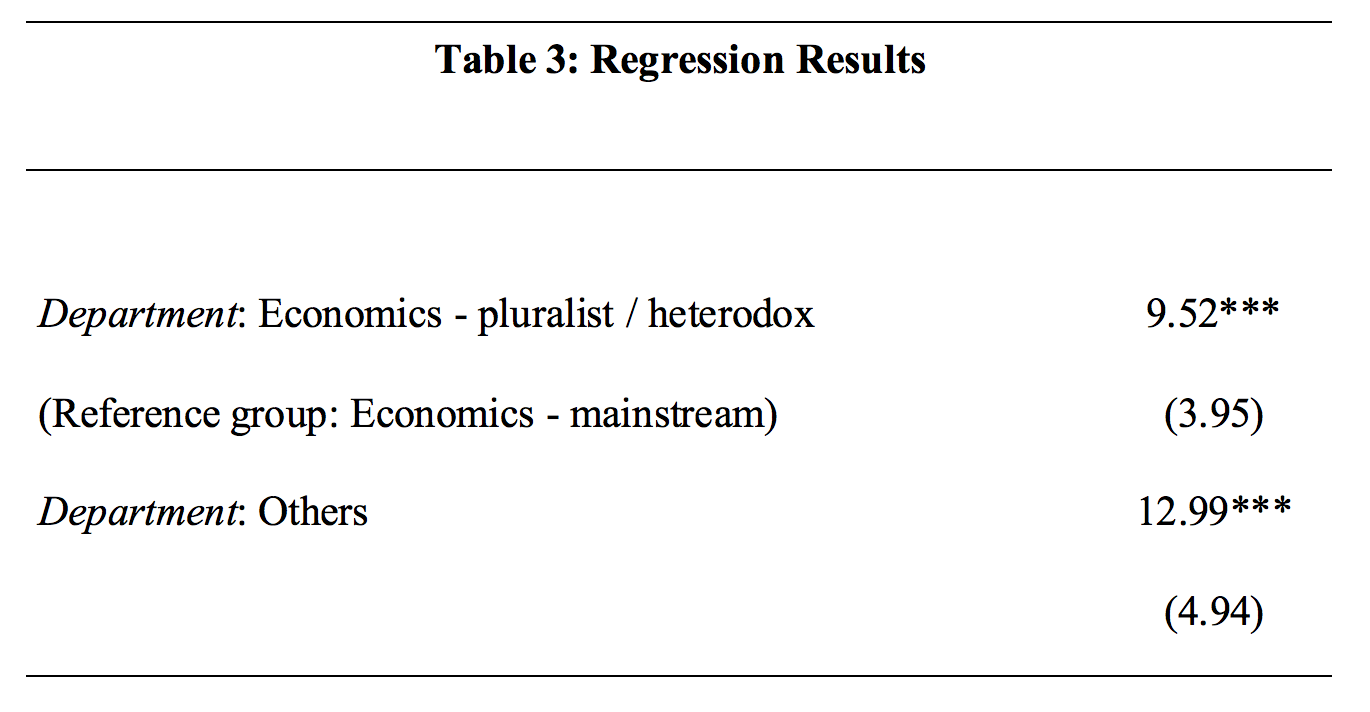
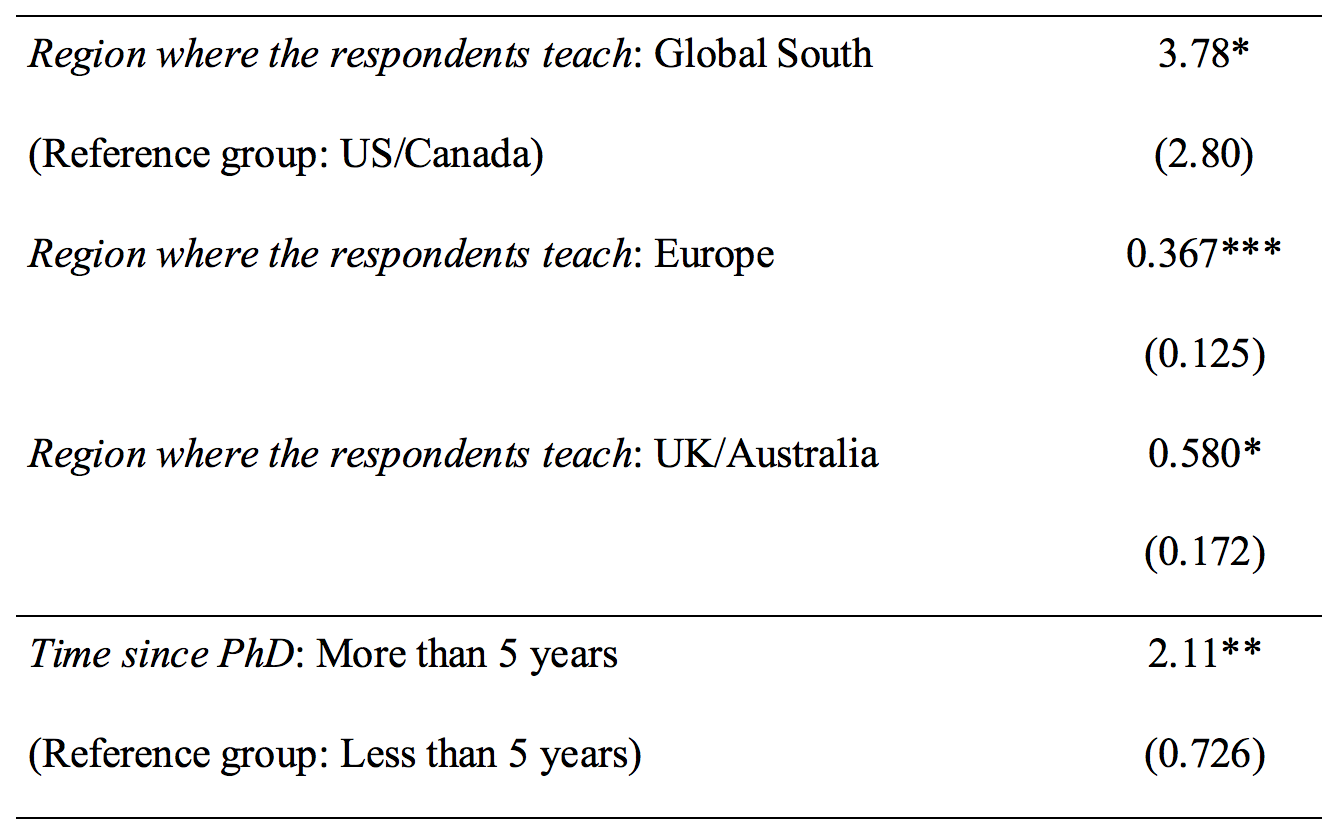
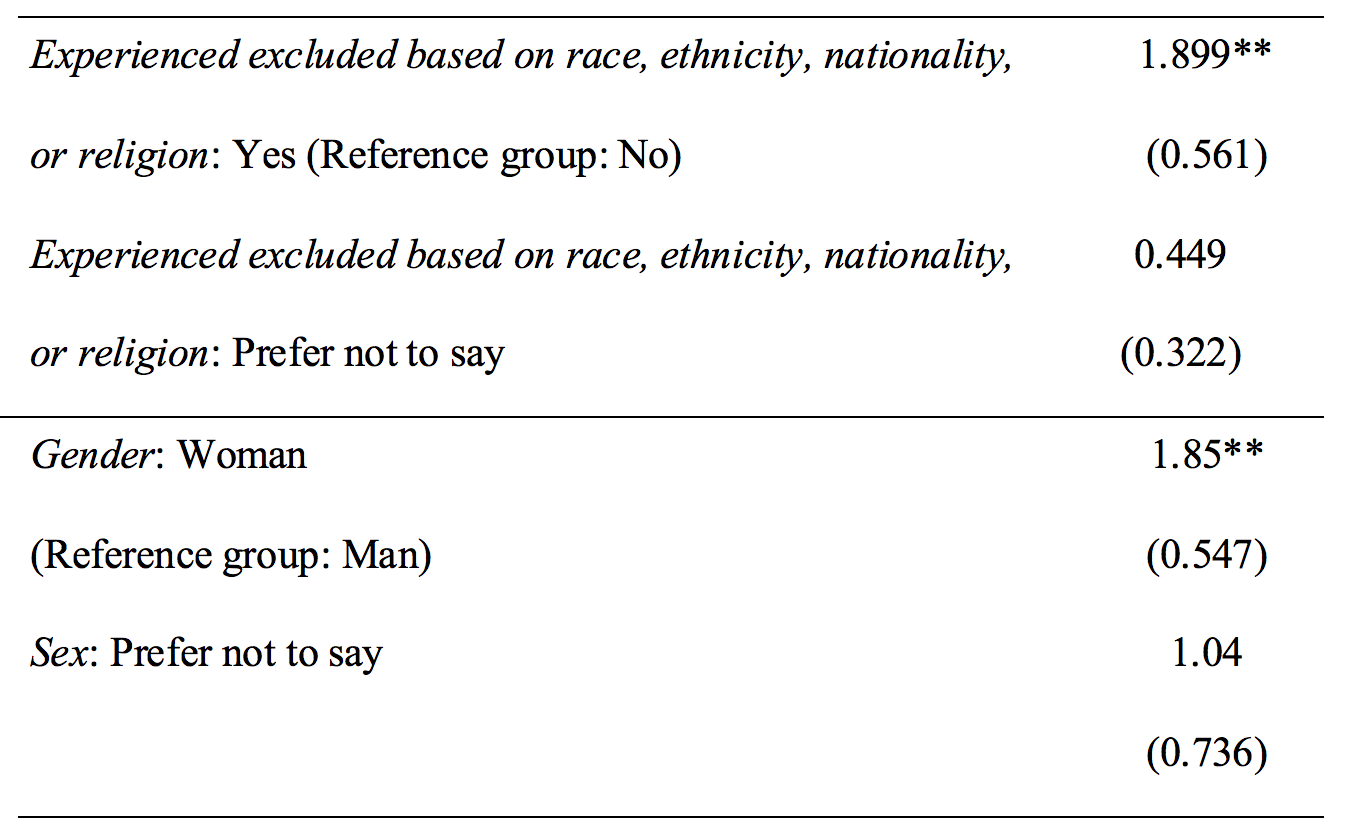
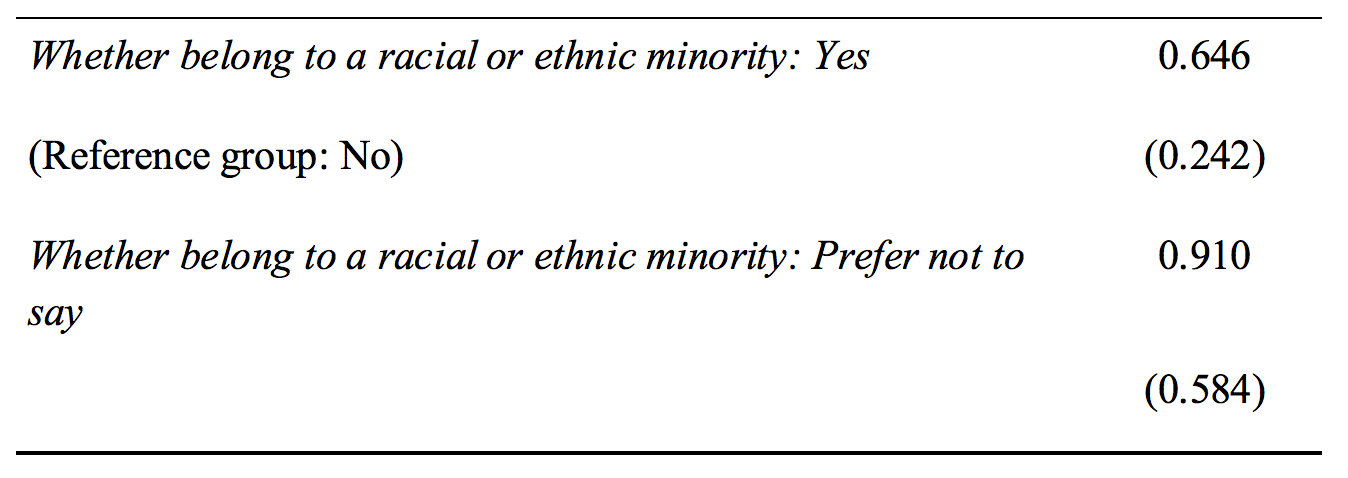
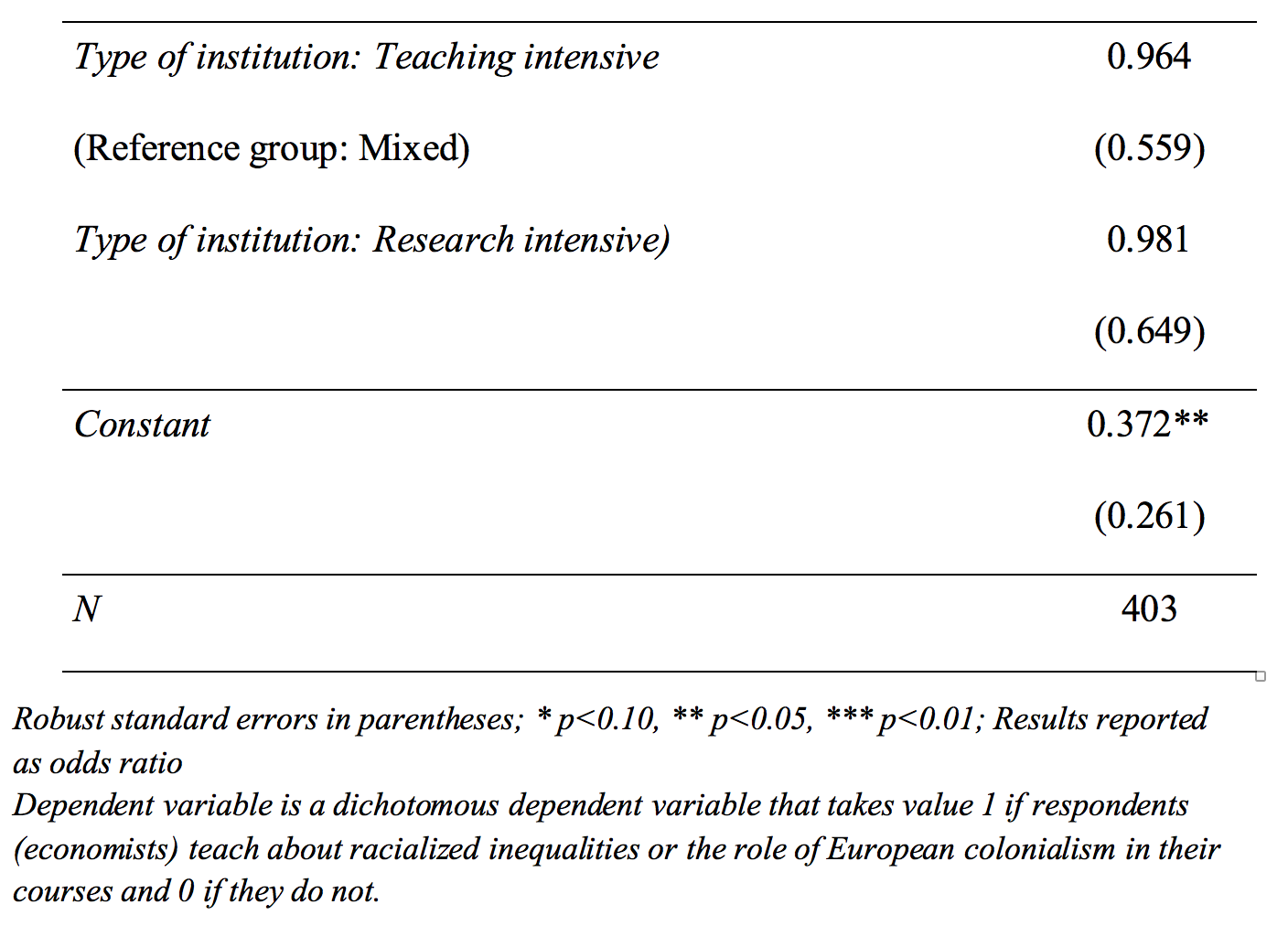
Where do we go from here?
Recognizing that mainstream Economics has a problem with understanding structural racism and incorporating historical legacies of colonialism in economic analysis is an important first step towards improving the field. We believe a change in the way economics is taught is important both in order to equip students with a better toolkit for understanding the world and to make economics more inclusive of Black students as well as students from other marginalized groups.
Reversing some of the above-mentioned narrowing of the field that has taken place over the past half century to give a larger space for political economy and heterodox economics is an important first step towards improving the field. However, it is not necessarily sufficient. At this current juncture there is also a need for a reform in the Economics curriculum, involving a turn towards including structural racism (or structural aspects of any identity-based inequality) as a central aspect of economic reasoning and to unpack the racialized origins of our discipline. On one hand, such a curriculum reform would need to ensure an incorporation of strands from non-mainstream literature that engage with the issues of structural racism and other group-based identities. On the other hand, such a reform also warrants a critical evaluation of methods in Economics, which, mistakenly, are often perceived as value-neutral, but, instead, are blind to these biases, and tend to reproduce these biases as a precise result of such blindness.
In this context, it is rather ironic that a report by the by the American Economic Association on the Graduate Education in Economics (COGEE) in 1991 concluded that “The commission’s fear is that graduate programs may be turning out a generation with too many idiot savants skilled in technique but innocent of real economic issues”. Despite such a strong conclusion, the discipline of Economics is geared towards churning out these ‘idiot savants’ every year, without questioning the central core and tools of mainstream Economics that ensures the reproduction of such economists innocent to these structural realities.
Beyond reform of the content of what economists teach, it is also important to explore ways of including reflections about White Privilege in the classroom, and to promote deep learning about race relations and the damaging subtleties of racism through reflections about our personal experience in a learning environment. Some broader actions that are needed to tackle racism within the field itself have been outlined by groups such as Diversifying and Decolonising Economics (see their affirmative action points) and the Sadie Collective (see their Open Plan).
The outrage by many economists against the institutional racism associated with police killings has been notable over the past month. It is time we direct this outrage towards our own discipline as well.
[1] We surveyed economists across 20 countries from top economics departments as well as economists in top departments in the fields of pluralist / heterodox economics, politics, political economy, and development studies.
[2] As we wrote in a previous post for INET, an example of this is that women were far more likely to recognize and engage with problems associated with excluding household work from GDP (see, for example, Nancy Folbre’s work). Another example is that women economists are more likely to consider labor market opportunities unequal than male economists are, given their everyday experience with labor market discrimination (see May et al. 2018).
[3] For a categorical independent variable, an odds ratio of greater than 1 implies that relative to the base category, those belonging to the non-base category are more likely to teach about racialized inequalities or the role of European colonialism in their courses and vice-versa for an odds ratio less than one.







